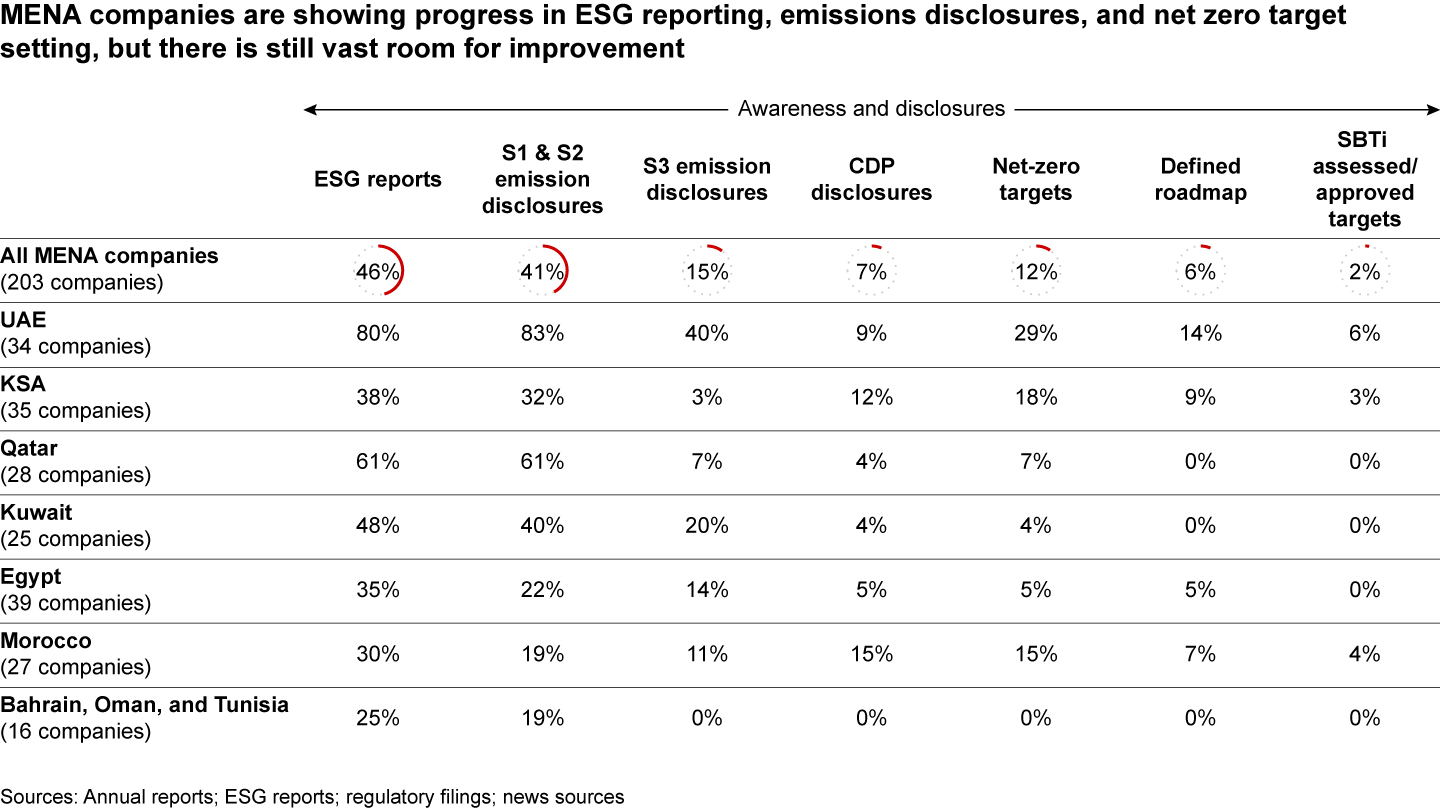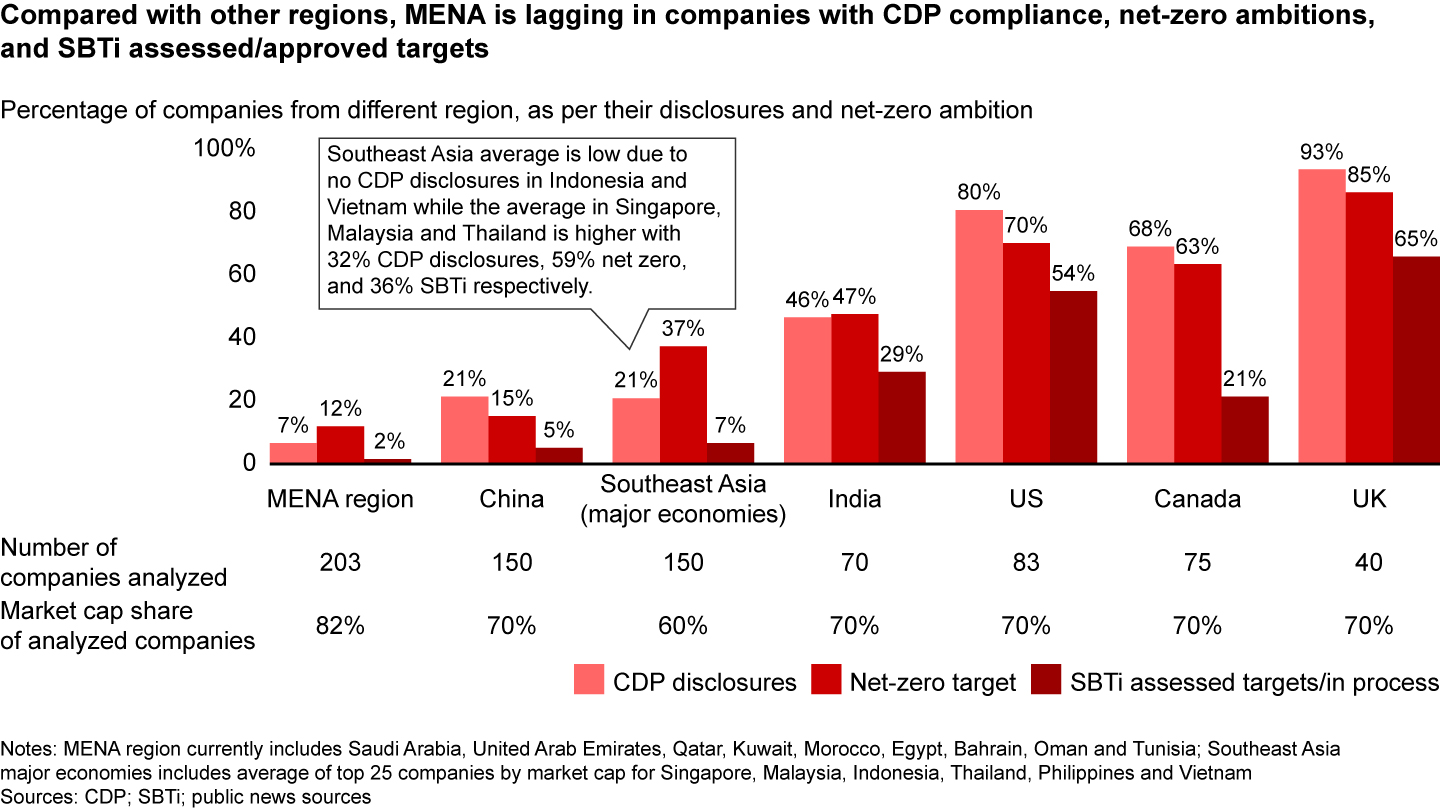World Economic Forum

Executive Summary
- The Middle East and North Africa region is warming at twice the global rate, which could impact the habitability of many of its cities by the end of the century.
- The region’s businesses can play a key role in pushing forward ambitious climate change goals.
- The World Economic Forum, in partnership with Bain & Company, has launched the Leaders for a Sustainable Middle East and North Africa, a region-specific coalition to accelerate corporate climate action.
This article originally appeared in the World Economic Forum.
No region will evade the consequences of a warming planet, but the Middle East and North Africa (MENA) is among the most vulnerable to its effects.
MENA is warming at twice the global average and is projected to be up to 4°C warmer by 2050. Some research indicates that this threat—compounded by food security, droughts and pollution—risks human inhabitability in many cities by the end of the century.
To mitigate this, some countries have begun integrating climate commitments into their strategic planning. The United Arab Emirates and Oman have announced a goal of net-zero by 2050, and the Saudi Green Initiative aims for net-zero by 2060. To support these goals, they have launched ambitious programmes to scale decarbonization pathways, like renewables and nuclear, and to develop emerging low-carbon technologies like green hydrogen and carbon-capture and utilization systems.
But strong policies must be accompanied by committed and strategic action from non-governmental stakeholders.
To meet their Nationally Determined Contributions (NDCs), countries need the private sector. Companies in MENA currently lag behind the rest of the world in corporate ambition related to national sustainability efforts.
Businesses in MENA can play a key role in protecting their country’s economy, environment and population from the impacts of climate change. By accelerating commitment, execution capability and resource availability, they can incentivize climate adaptation initiatives.
Current MENA private sector action
Bain & Company evaluated over 200 publicly listed and private companies for their disclosures and sustainability measures across MENA’s nine major economies. These companies constitute nearly 80% of the market cap of their countries’ stock exchanges and include the largest privately owned companies from hard-to-abate sectors, such as energy, chemicals, steel, aluminium, aviation, cement and utilities.
Encouraging signs of progress are reflected in the actions of some of the largest companies in the region. Companies like Majid Al Futtaim, ADNOC and Etihad Airways (UAE), Agility (Kuwait) and Saudi Aramco, ACWA Power and SABIC (Saudi Arabia) have all implemented actions designed to reduce emissions, increase renewables or scale nascent low carbon technologies such as green hydrogen and sustainable aviation fuel.
However, of the overall sample analyzed, only half have started ESG reporting, with 40% disclosing their Scope 1 and Scope 2 emissions. Approximately 12% have announced net-zero ambitions and only 6% have defined their roadmap. Therefore, there is vast room for improvement. In the region, there is a lack of transparent and globally consistent emissions disclosure policies, credible reduction roadmaps, or science-based target setting.
In MENA, there is little evidence of transparent and globally consistent emissions disclosures policies, credible reduction roadmaps or science-based target setting for the short-to-medium term (see Figure 1).
Of the companies analyzed, only:
- 7% disclose their emissions to the Carbon Disclosure Project (CDP).
- 2% have Science-Based Target initiative (SBTi)-assessed and approved targets—global standards for emissions disclosure and reduction targets.
- Roughly one-third of the companies include water or circularity-related initiatives.


This deficit is significant in comparison to other regions (see Figure 2). India, for example, is similar in economic size to the MENA region—around $3-3.5T GDP, but there:
- More than 47% companies of the 70 largest companies have net-zero ambition.
- 46% have CDP compliance.
- 29% have SBTi-approved targets or are in process of developing targets with SBTi.


Accelerated corporate action in MENA against climate change
While government is the foundation of a country’s climate ambitions, the private sector is its engine of innovation. But generalized altruism is not a sufficient enough motivation for action. The pathway to strategic success requires an awareness of and focus on:
- Strong investment rationale. Low-carbon technologies and infrastructures are good long-term investments. Investors across MENA are increasingly looking at the ESG performance metrics and net-zero plans of companies before committing capital. Companies with better ESG performance have reported improved employee satisfaction and workplace attractiveness.
- NDCs and net-zero targets. Policymakers adopt national targets to reduce emissions based on Article 6 of the Paris Agreement. This targeted assessment provides a blueprint for businesses to consider the best investment for the efforts. MENA region’s transition to net-zero hinges
upon businesses’ ability to accelerate their actions to drive critical technological innovation and business model changes over the next decade. Gradual, incremental changes are key in this effort.
- Extreme weather events. Given the significant likelihood of climate risks in the region, businesses must adopt pragmatic approaches towards climate adaptation that protect the environment and local populations.
- COP spotlight. Given that Egypt and the UAE will host COP27 and 28 respectively, the region’s businesses will be expected to demonstrate a greater commitment than usual. Likewise, action is expected to increase from all the stakeholders, including governments and regulators. Implementation is at the heart of these COP summits, with the first Global Stocktake Process (GSP) expected to be instituted in COP28.
Businesses leaders can act now on climate change
Business leaders can take actions today to aid MENA’s fight against climate change and insulate the region against the risks it poses.
- Embrace transition. Change begins at the top. Leaders can build awareness in their organizations by establishing a sustainability department and including top management on all climate-related initiatives and challenges.
- Adopt global practices. These include practices that consistently measure and disclose any emissions the organization is responsible for, transparent accounting policies and disclosure across Scopes 1, 2 and 3.
- Establish clear objectives. For climate change targets to be effective, it is important that ambitions are clearly articulated, with clear direction for action. Adopt a net-zero ambition and use a detailed roadmap with short-medium term targets to ensure success at every stage. Consider coordinating with SBTi for target assessment and robust tracking.
- Leverage procurement advantage. Encourage suppliers to act with transparency and commitment toward business sustainability goals. Mandate ESG weightage in procurement to increase suppliers’ emissions measurement, disclosures and reduction plans.
- Raise consumers awareness. Create targeted campaigns that increase awareness and create a compelling case for accelerated adoption of sustainable practices.
- Partner with the government. Businesses can work together with policymakers and regulators to define the standards, methodologies, and targets as the economy transitions. As the expectations and regulations are expected to increase, it is important for businesses to work collaboratively with policymakers to maximize impact.
The road ahead
Climate change can only be solved by the mobilization of all segments of society. That is why the World Economic Forum has brought together a coalition of progressive leaders from MENA including policymakers, business leaders, banks and industry experts to constitute Leaders for a Sustainable Middle East and North Africa (LSM), a region-specific coalition to accelerate corporate climate action and helping to shape COP27 and COP28 as major global milestones for public-private collaboration.
In the run-up to COP28, the LSM aims to create a platform for dialogue between the policymakers, businesses and financiers to exchange best practices, identify opportunities for collaboration and mobilize the ecosystem towards a just net-zero transition for the Middle East and North Africa.